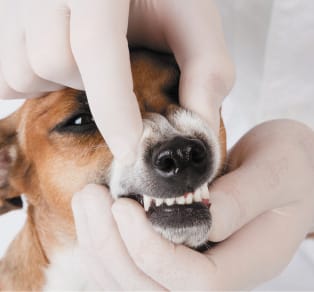Preventive dental care is as essential to your pet’s overall health as it is to yours
We’ll examine your pet’s teeth and gums during the annual check-up to detect any changes. We may schedule a comprehensive oral health exam, and treatment and x-ray depending on the results. We encourage you to make an appointment immediately if you notice any of these signs:
- Bad breath
- Broken or loose teeth
- Extra teeth or retained baby teeth
- Teeth that are discolored or covered in tartar
- Abnormal chewing, drooling, or dropping food from the mouth
- Reduced appetite or refusal to eat
- Pain in or around the mouth
- Bleeding from the mouth
- Swelling in the areas surrounding the mouth
You can help reduce severe dental disease by practicing regular home dental care. As with our teeth, regular oral exams and comprehensive oral health and treatment plans may be necessary to maintain optimal oral health.

Comprehensive Oral Exam
Oral exams are a part of any physical examination. A comprehensive oral exam includes your pet’s head and neck and an intraoral evaluation during which your pet will be sedated. We’ll check their bite, the number of teeth, and the general condition of their mouth’s critical structures, as well as the larynx and tonsils. However, it is impossible to completely assess oral health until your pet is anesthetized. As part of every dental procedure, a comprehensive exam of all oral structures is performed.
Dental Cleaning
Our dental cleaning procedure, performed while your pet is under anesthesia, includes safely removing built-up plaque and tartar from all tooth crowns as well as from below the gumline.

Digital Dental Radiography
Our digital x-ray system allows us to quickly take a complete set of dental radiographs, which minimizes the time your pet will be anesthetized and enables us to identify any problems easily hidden below the gumline. If we find a diseased tooth, we can immediately discuss treatment options to save or safely remove the tooth.
Oral Surgery
If your pet has an advanced stage of periodontal disease, surgery may aid tissue regeneration. If we are unable to keep a tooth healthy, surgical extraction may be needed. More complicated surgeries may be recommended to remove tumors or repair palate defects or fractures.
- Comprehensive Oral Exam
- Dental Cleaning
- Oral Surgery